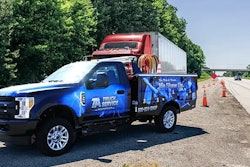Trucking news and briefs for Friday, Nov. 28, 2025:
- FMCSA knows there's a truck parking shortage, but it needs hard data on monetary benefits of building new spaces.
- Rest areas closing for the winter in this upper Midwest state.
- ATA among organizations founding coalition aiming to establish federal framework for autonomous vehicles.
FMCSA plans study on truck parking shortage
The Federal Motor Carrier Safety Administration, in a Federal Register notice published Friday, announced that it’s planning to submit a new Information Collection Request (ICR) to the White House for review and approval that will allow the agency to conduct a study on the truck parking shortage.
The proposed study, titled “Quantifying the Benefits of Creating New Truck Parking Spaces,” will collect approximately 1,000 survey responses from truck drivers about their experiences finding truck parking spaces, with a goal of estimating the monetary benefits of creating new truck parking spaces.
In its notice, FMCSA highlights the truck parking shortage’s consistent ranking as one of the industry’s most pressing issues. In 2023 and 2024, the parking shortage ranked as the No. 2 overall industry concern in the American Transportation Research Institute’s “Critical Issues in the Trucking Industry” report. Truck parking dropped to the No. 4 overall concern in this year’s report.
[Related: Brokers, parking, emissions regs: Owner-ops' top trucking concerns]
The agency added that “many government, safety, and industry organizations are working to create more truck parking spaces,” but contended that “there is a lack of research on the actual precise monetary benefits of new truck parking spaces.” Those “benefits,” according to FMCSA:
- Decreasing carriers’ costs
- Increasing drivers’ well-being
- Reducing the number of crashes

“Although researchers have conducted many other surveys on truck parking, none have reliably estimated the statistics needed, including how often and how long truck drivers (a) park in unauthorized spaces, (b) stop driving early to obtain a parking space, (c) drive off their routes to find parking, and (d) drive past hours-of-service limits to find parking,” according to FMCSA’s notice.
The agency said results from its proposed survey “will be combined with related research to produce estimates of the benefits of creating new truck parking spaces in different areas, which could be beneficial to the many government and private organizations that decide where to build new truck parking spaces.”
In addition to estimating the benefits of new truck parking spaces, FMCSA wants to answer these related questions:
- How many trucks are parked in authorized and unauthorized areas per day, on average? In other words, how large is the nationwide shortage of truck parking spaces?
- What are the most cost-effective methods for increasing truck parking capacity?
- Which truck parking information management systems are used most often and are most effective?
- What percentage of drivers routinely make reservations, pay for parking, or use various other truck parking services?
Several thousand truck drivers, from a wide range of sectors, will be asked to complete the 25-minute online survey, with a goal of obtaining approximately 1,000 complete responses.
FMCSA is seeking feedback on the proposed survey, including whether it’s necessary for the performance of FMCSA’s functions, ways for FMCSA to enhance the quality, usefulness, and clarity of the collected information and more. Comments can be filed for 60 days at www.regulations.gov by searching Docket No. FMCSA-2025-0787.
[Related: Nevada asks for truckers' input on truck parking]
Five Michigan rest areas closing for winter
The Michigan Department of Transportation (MDOT) announced that five of the state’s 61 rest areas will close during the winter due to “safety concerns.”
"Many travelers look to our network of rest areas for a safe stopping point on their travels, which is why we keep as many open as possible year-round," said MDOT Transportation Systems Management and Operations (TSMO) Division Administrator Kim Zimmer.
Only five rest areas are closed each year for a 20-week period, which will be this winter from Dec. 1, 2025, to April 20, 2026.
The seasonal closures, MDOT said, are due to reduced use during winter months and safety concerns, such as steep entrance and exit drives and potentially slippery conditions on stairways between parking lots and buildings.
The following five rest areas will close Dec. 1 and reopen in April:
- St. Ignace Rest Area on SB I-75 in Mackinac County
- Ludington Rest Area on NB I-75 in Cheboygan County
- Hebron Rest Area on SB I-75 in Cheboygan County
- Hart Rest Area on SB U.S. 31 in Oceana County
Closed rest areas are locked and winterized, with exit and entrance ramps barricaded. Designated rest areas will have "Closed Until Spring" signs posted and will have the mileage to the next open rest area listed. Closed rest areas will also be listed on MDOT's website.
[Related: Get your 2025 Highway Report Card: Worst roads, state DOTs, parking deserts]
New coalition looks to advance federal autonomous vehicle policy framework
A group of 28 organizations this month announced the formation of a new coalition, United for Autonomy, dedicated to advancing a federal policy framework for autonomous vehicles (AVs) in the United States.
The coalition’s goal is to establish a clear, consistent federal framework that enables the safe deployment of AVs while maintaining America’s global leadership in the industry.
Jeff Farrah, CEO of the Autonomous Vehicle Industry Association (AVIA) announced the formation of the coalition.
“It is exciting to see a broad range of stakeholders come together to push common sense policy that will solidify American leadership in autonomous vehicles,” he said. “Autonomous vehicles have the potential to dramatically reduce the 40,000 traffic fatalities we see each year, provide independence to people who cannot drive, and strengthen American supply chains. But realizing that potential requires federal government leadership.”
[Related: FMCSA clearing path for autonomous rigs with recent waiver?]
A federal policy framework has been championed by AVIA, a founding member of United for Autonomy. The association put forward policy recommendations in Securing American Leadership in Autonomous Vehicles, earlier this year. The recommendations for policymakers emphasized the need for federal action to secure the United States’ position as a global leader in autonomous vehicle (AV) technology while ensuring safety, fostering innovation, and promoting economic resilience.
The coalition plans to engage with lawmakers, regulators, and the public to build support for a federal policy framework for autonomous vehicles.
United for Autonomy is comprised of 28 organizations, including AVIA, the American Trucking Associations, the Truck & Engine Manufacturers Association (EMA), the Institute for Safer Trucking, MEMA and more.
[Related: Driverless-truck tech: Owner-operators worry over cyber attacks, crashes, competition]










